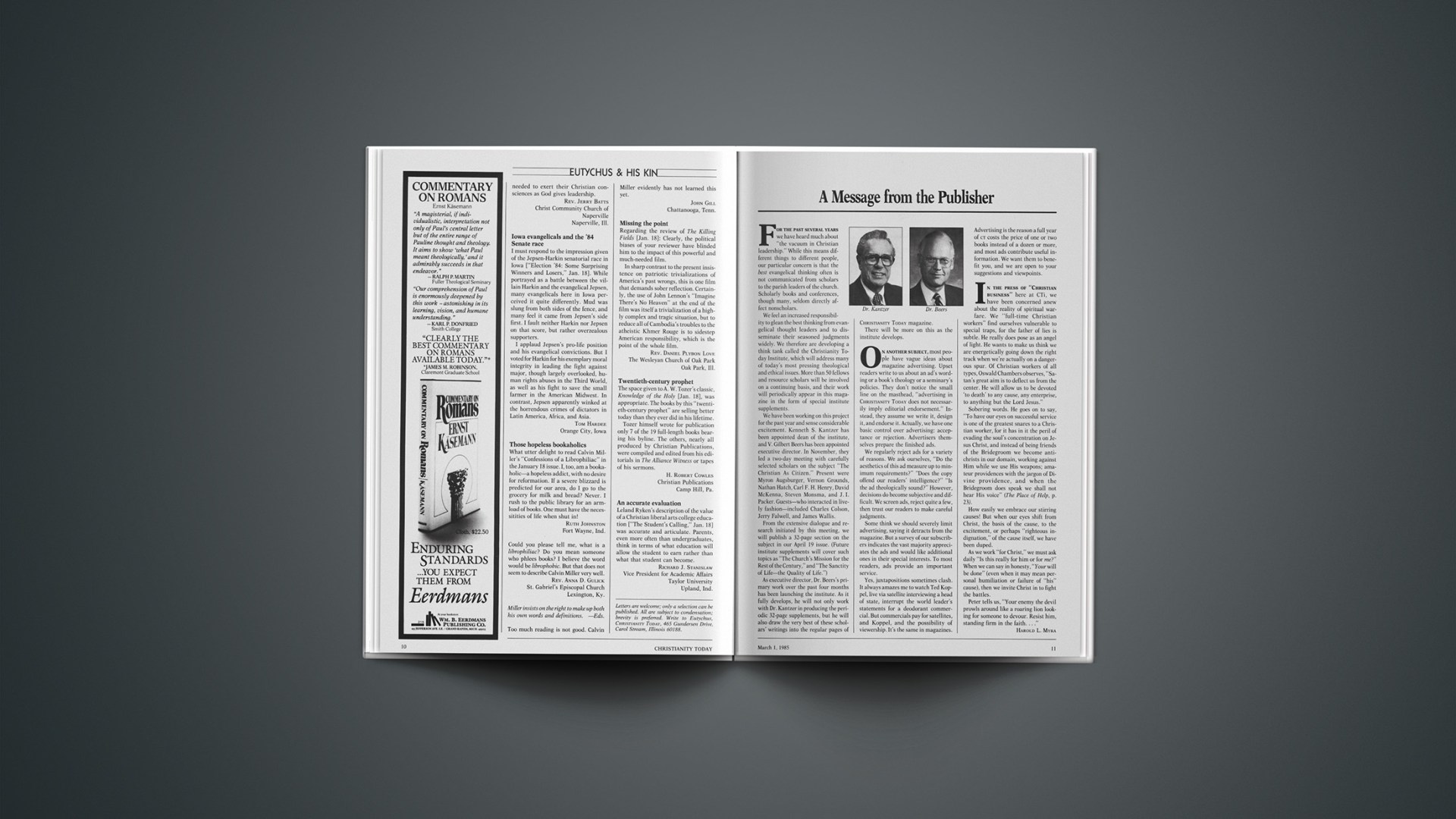For the past several years we have heard much about “the vacuum in Christian leadership.” While this means different things to different people, our particular concern is that the best evangelical thinking often is not communicated from scholars to the parish leaders of the church. Scholarly books and conferences, though many, seldom directly affect nonscholars.
We feel an increased responsibility to glean the best thinking from evangelical thought leaders and to disseminate their seasoned judgments widely. We therefore are developing a think tank called the Christianity Today Institute, which will address many of today’s most pressing theological and ethical issues. More than 50 fellows and resource scholars will be involved on a continuing basis, and their work will periodically appear in this magazine in the form of special institute supplements.
We have been working on this project for the past year and sense considerable excitement. Kenneth S. Kantzer has been appointed dean of the institute, and V. Gilbert Beers has been appointed executive director. In November, they led a two-day meeting with carefully selected scholars on the subject “The Christian As Citizen.” Present were Myron Augsburger, Vernon Grounds, Nathan Hatch, Carl F. H. Henry, David McKenna, Steven Monsma, and J. I. Packer. Guests—who interacted in lively fashion—included Charles Colson, Jerry Falwell, and James Wallis.
From the extensive dialogue and research initiated by this meeting, we will publish a 32-page section on the subject in our April 19 issue. (Future institute supplements will cover such topics as “The Church’s Mission for the Rest of the Century,” and “The Sanctity of Life—the Quality of Life.”)
As executive director, Dr. Beers’s primary work over the past four months has been launching the institute. As it fully develops, he will not only work with Dr. Kantzer in producing the periodic 32-page supplements, but he will also draw the very best of these scholars’ writings into the regular pages of CHRISTIANITY TODAY magazine.
There will be more on this as the institute develops.
On another subject, most people have vague ideas about magazine advertising. Upset readers write to us about an ad’s wording or a book’s theology or a seminary’s policies. They don’t notice the small line on the masthead, “advertising in CHRISTIANITY TODAY does not necessarily imply editorial endorsement.” Instead, they assume we write it, design it, and endorse it. Actually, we have one basic control over advertising: acceptance or rejection. Advertisers themselves prepare the finished ads.
We regularly reject ads for a variety of reasons. We ask ourselves, “Do the aesthetics of this ad measure up to minimum requirements?” “Does the copy offend our readers’ intelligence?” “Is the ad theologically sound?” However, decisions do become subjective and difficult. We screen ads, reject quite a few, then trust our readers to make careful judgments.
Some think we should severely limit advertising, saying it detracts from the magazine. But a survey of our subscribers indicates the vast majority appreciates the ads and would like additional ones in their special interests. To most readers, ads provide an important service.
Yes, juxtapositions sometimes clash. It always amazes me to watch Ted Koppel, live via satellite interviewing a head of state, interrupt the world leader’s statements for a deodorant commercial. But commercials pay for satellites, and Koppel, and the possibility of viewership. It’s the same in magazines. Advertising is the reason a full year of CT costs the price of one or two books instead of a dozen or more, and most ads contribute useful information. We want them to benefit you, and we are open to your suggestions and viewpoints.
In the press of “christian business” here at CTi, we have been concerned anew about the reality of spiritual warfare. We “full-time Christian workers” find ourselves vulnerable to special traps, for the father of lies is subtle. He really does pose as an angel of light. He wants to make us think we are energetically going down the right track when we’re actually on a dangerous spur. Of Christian workers of all types, Oswald Chambers observes, “Satan’s great aim is to deflect us from the center. He will allow us to be devoted ‘to death’ to any cause, any enterprise, to anything but the Lord Jesus.”
Sobering words. He goes on to say, “To have our eyes on successful service is one of the greatest snares to a Christian worker, for it has in it the peril of evading the soul’s concentration on Jesus Christ, and instead of being friends of the Bridegroom we become antichrists in our domain, working against Him while we use His weapons; amateur providences with the jargon of Divine providence, and when the Bridegroom does speak we shall not hear His voice” (The Place of Help, p. 23).
How easily we embrace our stirring causes! But when our eyes shift from Christ, the basis of the cause, to the excitement, or perhaps “righteous indignation,” of the cause itself, we have been duped.
As we work “for Christ,” we must ask daily “Is this really for him or for me?” When we can say in honesty, “Your will be done” (even when it may mean personal humiliation or failure of “his” cause), then we invite Christ in to fight the battles.
Peter tells us, “Your enemy the devil prowls around like a roaring lion looking for someone to devour. Resist him, standing firm in the faith.…”










